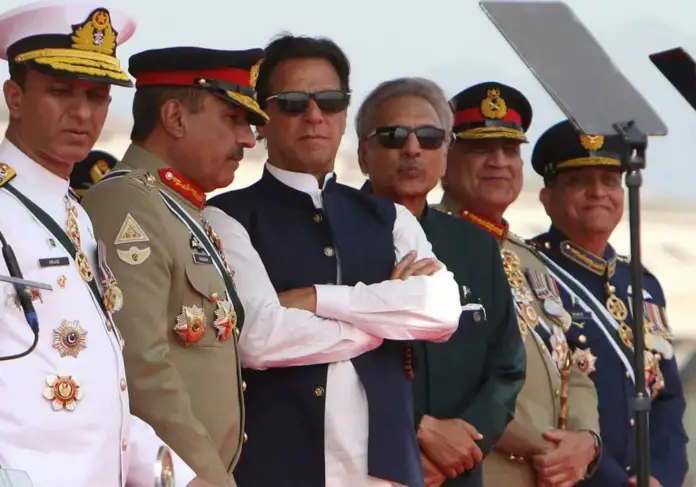Pakistan has been coping with a fragile democratic setup ever since it was founded, the fundamental problem is not just the way democracy is set up to function but also the mentality of wise men that always have a bias toward power.
The civilian administrations up until now who are (or have been) the targets of manipulations have been able to maintain power, although frequently at the expense of giving up their prerogatives.
After Musharraf’s administration ended and civilian rule was restored in 2008, little to nothing has been done to decrease the role of the military in politics, which has become more actively involved in undermining the civilian administration.
The military has vowed to uphold democracy ever since Pervez Musharraf left office in 2008. However, the alleged meddling continued.
Additionally, it has made an effort to establish a power-sharing agreement that would guarantee military control over crucial areas according to the Economist Intelligence Unit (EIU) report including defence, diplomacy, and internal security.
The Pakistani military effectively integrated itself into politics during the 2008 elections under the post-Musharraf regime. The involvement of the military in politics for 70 years was accepted by the former chief of army staff (COAS) Qamar Javed Bajwa in his farewell speech.
The issue is that neither side, the military establishment or the Democrats understands another’s function, so they keep interfering and denying one another the space they require to succeed.
No one can deny the role of the establishment’s involvement, and we even know that every political party has had support from wise men in some capacity when it comes to gaining power. However, we have seen fallout between opposing sides in the past.
According to the masses’ opinion, the military establishment believes that if we support a given political party or leader at a certain moment, he would act by our wishes, and democratic leaders think that if we pick someone to command the army, he will serve our interests.
Talking about the establishment perspective, which is unable to transcend past the idea that you are in office because we put you there, is outdated and ineffective. Nawaz Sharif had considerable public backing in the 1990s when the army helped him overthrow the Benazir administration.
Former ISI chief Asad Durrani accepted in the Supreme Court that in 1990, the then-army chief Mirza Aslam Beg instructed him to give millions of dollars to political figures and groups to undermine the Benazir Bhutto-led PPP)government.
After Benazir’s assassination, the PPP formed the government in 2008, and Asif Ali Zardari was elected Pakistan’s President with PML-N on his side. The PML-N plan was eventually altered, and Nawaz was aided to taking power in 2013 after the PPP’s bad reputation of corruption in five years amongst the public.
Nawaz Sharif received support from the establishment since he was popular at the time and it was evident that he would form the federal government. After the fallout with Nawaz, the establishment-backed Imran Khan in 2018 because he was a strong candidate and possibly the only alternative since PPP was limited to interior Sindh.
Everyone bets on the horse they think will win the race; nobody stakes money on a horse they believe will lose. It’s not the greatest advice to take credit for elevating a leader who was already well-liked to the position of prime minister.
Nawaz Sharif’s exit following the Panama disqualification strengthened his narrative. Imran Khan’s departure following the vote of no confidence has strengthened his narrative even further. Why then does the establishment not consider and recognize that it sells anytime a political leader chooses to make a case against military involvement in Pakistan? Why do the Pakistani people appreciate this narrative?
The primary reason is that because of changing times and the repetition of the same script, people are increasingly aware of Pakistan’s political dynamics. It is tough to justify meddling in politics in today’s world because the other side is not performing its duties. It is also impossible to brand someone corrupt for years and then expect people to embrace the same group as “angels.”
Politicians and the military establishment in Pakistan are realities that cannot function through competition or rivalry amongst them. To deliver and develop, everyone must recognize and respect each other’s space. Politicians cannot be used as tools to further their goals also they cannot be utilized as puppets. If the fundamental error of understanding each other’s roles and respecting limits to function is made, the democratic system can only operate to its full potential.







